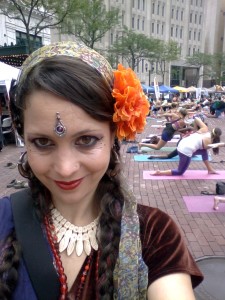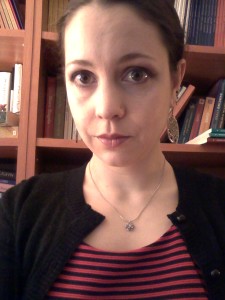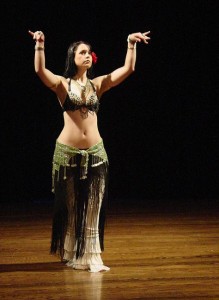One of my “play hard” moments, on an aerial hoop at Cirque Indy.
Welcome to the next installment of my Workaholic Missives post series, wherein I talk about my philosophy behind work/life balance (or lack thereof, as some would have it).
I know it’s trite, but I try to live by the phrase “Work hard, play hard.” I like the website Get Bullish’s take on this: “If it isn’t extremely productive or extremely pleasurable, just stop. Either eat something healthy that takes five minutes, or have a huge decadent meal with friends for two hours. Either go to the gym and work every fucking muscle in your body like an Olympian, or stay home and find someone to make out with.”
Basically, the idea here is that if you’ve got limited time in which to be awesome, either spend it being as awesome as possible, or recharging as aggressively as possible. I know, the idea of recharging aggressively seems weird to some, but that’s how I’ve been exploring work/life balance in the last few years, and I’ve really enjoyed it. This blog post shares some of my strategies for making it work.
As a freelancer, I run the risk of always working. There’s always another proposal to write, a blog post to pitch, or a project to write, revise, etc. I know this is ingrained into me by academic culture to some degree (see my post on normalized weekend work at Conditionally Accepted), but I’ve also had to navigate the “you should be working more!” ethos of freelancing. Piling one on top of the other has not necessarily been that healthy for me.
Luckily, I’m all about the self-care interventions. And sometimes that means aggressive self-care: taking a weekend off to travel because I’m on the verge of burn-out, or scheduling a massage after a lunch date but right before a work date followed by rock climbing (a.k.a. last Tuesday). I take care to always meet my commitments to others, backing out only when it’s really dire, but I match that persistence with a commitment to myself as well: to engage in what is healthy and pleasurable as much as I can possibly fit in, justify, and/or afford.
The “work hard” part of the phrase means that I try not to waste time on things that are not-work, assuming that I have the energy and the mental focus to put in good work. Since I do a range of activities in my freelance life, it could mean deciding whether I have the attention span to do something related to a college class I’m teaching (lesson planning and grading papers tend to take the most focus, whereas small tasks like recording attendance are less strenuous) or whether I should do something on social media that’s less obviously related to a project I’m on, but could help promote my work in ways that might be fruitful later. It could be the difference between “work on my book proposal while I’ve got the brain power for it” and “send out inquiries about a performance opportunity for my dance troupe because those are halfway scripted already.”
The “play hard” hard of the phrase means that I take my relaxation seriously, and I try to fill it with activities that not only recharge me, but about which I’m passionate. That can be a tricky balance: for instance, I truly love dancing, but sometimes I’m just too tired from all my other stuff to really make a serious go of a night out dancing. So it might mean practicing at home a little bit, followed by watching performances by some of my favorite dancers, in order to get that creative charge going. When I’m totally worn out and can’t brain anymore, then I’ll do something low-key that I still really love, like reading a novel or spending time with someone I care about. Watching trashy TV tends to fall pretty low on the list… yes, even I have a few guilty pleasure TV shows, but I tend to combine them with social time (my life partner and I have a list of shows we’re working our way through) or with introvert time (like if I can write in my journal or knit while watching a show).
On the flip side, the “play hard” aspect means that if some relaxation or social activity doesn’t really appeal to me, and I don’t have a good reason to do it regardless, I’m probably going to turn it down. My free time is too limited for me to spend it in an activity that doesn’t serve me.
So, yes, I’m very mercenary in how I make my choices with my free time, in large part because of this need for balance that I perceive. On that note, time to make a shopping run for a dinner party, before working out, before a lunch date, before teaching a dance workshop, before spending the rest of the day working on grading and writing. Like ya do… if you’re me.





